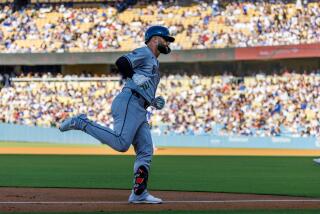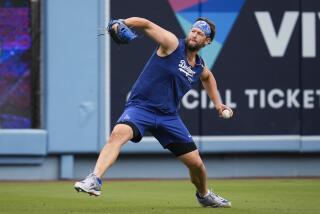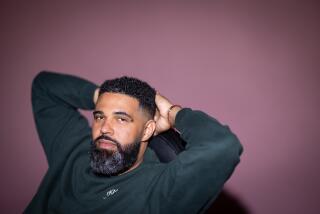Back in the Limelight : After Shoulder Surgery, Herschel Walker Is Able to Meet Opposing Teams Head-On
EAST RUTHERFORD, N.J. — Herschel Walker rose from yet another interview and gingerly made his way across the room to his locker at Giants Stadium. He was walking slowly and carefully, as one does when there’s broken glass on the kitchen floor.
It was the morning after a night game, and Walker’s knees were sore. Those knees are reminders that Walker really isn’t a kid anymore. They are reminders of all the years and yards, all the touchdowns.
Who could forget the time at the University of Georgia when Walker, then a freshman, ran for 283 yards in one game? Who could forget the newspaper headlines when he decided to skip his senior year at Georgia and sign up with something called the United States Football League? And what about the season when everyone said Walker was dogging it; the year he took the money and didn’t run? What about the year he proved everyone wrong.
Herschel Walker, it seems, has been around forever.
It doesn’t seem possible that he just turned 23 years old on March 3.
It seems odd to be doing a story about his comeback.
His life, from the time he first touched a football at Johnson County High School in Wrightsville, Ga., has been one of flash bulbs and interviews. A genuine phenom he was, a back who could have won the Heisman Trophy every year he played at Georgia.
But no matter how glossy his statistics may look in a media guide, the Walker legend went dormant when he joined the New Jersey Generals three years ago. You can blame it on the league he joined or on Walker himself. Sure, he gained more than 3,100 yards in his first two seasons in the USFL, but they were quiet yards.
No longer did people gasp when he hit the line of scrimmage. No longer did scouts drool at the mention of his name. Walker ran timidly through the USFL, like a fawn through the forest. His big contract made him soft, some said. Critics turned on him. One NFL draft preview claimed he was not quite Superman, as promised.
Perhaps not.
But sometime between last season and this, Walker slipped back into the phone booth, then emerged, running again as if Georgia was on his mind.
He is today the USFL’s most punishing rusher, the runaway train he was supposed to be all along. He is leading the USFL with 1,332 yards through 11 games and averaging 5.7 yards a carry. Spread the word, Herschel is back.
Columnists in New York have spent this season writing Walker apology stories.
People around the league are still talking about his explosive 88-yard run against the Houston Gamblers a few weeks ago.
Ah, respect once again. The Dallas Cowboys picked Walker in the fifth round of the recent NFL draft, even though Walker’s lucrative personal services contract with New Jersey owner Donald Trump extends through 1989.
“There’s no telling how good he can be,” General Coach Walt Michaels said. “He’s just a baby.”
Michaels has been so bold as to compare the new Walker with Jim Brown. Michaels said he is not blowing smoke. Michaels, a former linebacker with the Cleveland Browns, was once Brown’s teammate.
“Jim was more of a gliding type of player,” Michaels said. “Herschel is more punishing, a more bruising type of runner. I should know, I remember trying to tackle Jim many times.”
Michaels said it’s time for Walker to get his due.
“People would come out and say that Herschel’s not this and he’s not that,” Michaels said. “I think it’s time for people to say that they were wrong.”
But the people were right about Walker. He hasn’t been the same back he was at Georgia. But it wasn’t because he wasn’t trying.
His problems weren’t with his legs or in his mind. Walker’s shoulders were slowing him down.
Not many people knew about it because Walker refused to publicize it. To those not in the know, it appeared Walker was coasting.
“I really don’t worry about what people say,” Walker said. “You can’t worry about that. You can only satisfy yourself. I don’t worry about the criticism. I won’t say the shoulder was a big thing. And I don’t think 1,300 yards is anything to be ashamed of. But I really couldn’t lower my head. It took some of that away.”
Had Walker told the world about the pain in his shoulder, perhaps the critics would have been kinder. But Walker remained quiet.
“I saw the pain,” offensive guard Wayne Harris said. “I can’t tell you how many times his shoulder popped out of its socket, and he’d have to go to the sidelines and have someone pop it back in. Why didn’t he publicize it? Well, if (quarterback) Doug Flutie had a bad arm you wouldn’t publicize it either because the other team would go after it.
“But (Walker) was in pain. He’d be lying on the ground, and you could see it in his face. Then, he’d just jog off the field to keep everyone from knowing.”
Only now will Walker admit that he wasn’t the same runner.
“This year gives me a great deal of satisfaction,” he said. “Last year I really couldn’t do anything without having to go to the sideline and have my shoulder worked on.”
To trace the saga of Walker’s shoulder, you have to return to his freshman season at Georgia. In the Sugar Bowl, against Notre Dame, Walker dislocated his left shoulder.
“And I’ve dislocated it every year since,” Walker said.
Doctors recommended surgery, but Walker wasn’t thrilled with the idea.
“I didn’t want to be cut on,” he said, firmly.
Walker strengthened the shoulder with weights. That worked long enough for him to win the Heisman as a junior in 1982.
But the injury was a constant pain, even during his first year in the USFL, when he led the league in rushing with 1,812 yards in 18 games.
Finally, after a sub-par year last season, Walker decided to have the operation. Last July, Mark Schottenfeld, the Generals’ orthopedic surgeon, operated and tighted the ligaments in Walker’s shoulder.
Walker could hardly believe the difference. Once again, he could lower his shoulder and meet the defense head-on.
“I have no pain in my shoulder, and the offensive line is playing extremely well,” Walker said.
And that’s meant nothing but trouble for opponents, who already have enough to worry about in trying to contain General quarterback Doug Flutie.
Flutie’s passing and Walker’s running have helped the Generals to an 8-3 record. Some Generals say the arrival of Flutie has brought the best out of Walker, who, for the first time in his career, had to take a back seat to someone in publicity.
“You may say it might have taken some pressure off him,” Harris said. “But it might have put more on him. Ever since he first stepped on a football field, he’s been the star. That’s not to say he wants all the glory, but he has a lot of pride. He wants to be the best on the field.”
So far this season, he has been.
Walker broke the USFL single-game rushing record against the Houston Gamblers April 7. That was the game that convinced the doubters that he was for real. Walker rushed for 233 yards against the Gamblers, getting off an 88-yard run early in the first quarter.
The run was vintage Walker. He broke through a hole on the right side, then used his world-class speed to outrun two Gamblers to the end zone. Houston defenders had clear-cut angles down the right sideline, but it’s funny how angles don’t mean as much when you’re chasing a guy who can almost run as fast backward as you can forward.
“It’s a great feeling to make a block that the normal guy will get five yards on and know that Herschel can get you 80,” Harris said.
Flutie, the quarterback, had a good view of the run. He said afterward that he was thinking about how his former Boston College teammate, Troy Stradford, would have handled the run.
“He’d get about an eight-yard gain,” Flutie told the New York Times. “I was amazed that Herschel kept running to the outside. He got to the sideline, turned the corner and accelerated. Then he ran away from three guys who had angles on him. I couldn’t believe it.”
Walker’s stock has risen considerably in recent weeks, and his name started popping up frequently as the NFL draft drew closer.
When the Cowboys drafted him, it seemed a waste, since Walker is bound to the Generals for four more years. But the Cowboys figured it was a calculated gamble. If the struggling USFL should fold in the next couple of years, the Cowboys will have Walker’s NFL rights.
In 1964, Dallas used a 10th-round pick to draft quarterback Roger Staubach, even though Staubach was bound for five years to the U.S. Navy. The Cowboys were willing to wait, and Staubach eventually led Dallas to five Super Bowl appearances and two championships.
Although owner Trump has a personal services contract with Walker, the running back could, possibly, sign with the Cowboys.
Walker, who does not like to stir controversy, said he doesn’t see any of that happening.
“When I signed with the USFL, I signed to help the league survive,” he said. “I’m happy to see the league progress as it had. The NFL draft was not in my mind. Maybe it would be flattering if I stopped to think about it.”
Besides, Walker may no longer be in football at that time.
Last winter, he returned to the University of Georgia and obtained his degree in criminal justice.
“I’ll probably play a few more years, but I still want to get into the FBI,” Walker said. “It’s something I’ve always wanted to get into. The work is exciting. I like finding out things.”
Herschel Walker, an undercover agent?
“I could wear a beard or something,” he said.
For now, though, he’s just happy to be back on anyone’s most wanted list.
More to Read
Go beyond the scoreboard
Get the latest on L.A.'s teams in the daily Sports Report newsletter.
You may occasionally receive promotional content from the Los Angeles Times.











